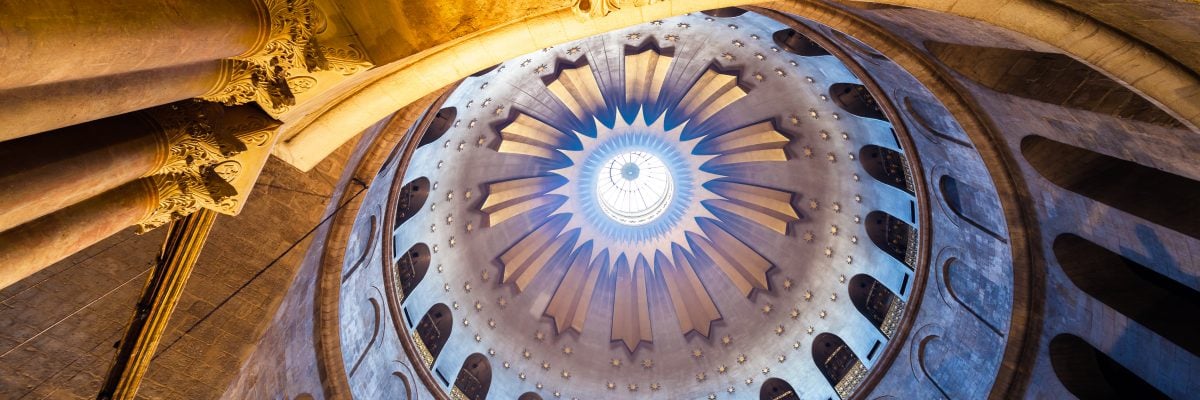
When I was first investigating Catholicism, a Catholic friend was explaining to me the importance of the four marks of the Church—that, as the Nicene Creed tells us, the Church is one, holy, catholic, and apostolic.
As an Evangelical Protestant, I had given little thought to the Nicene Creed, and even less to the four marks. Still I quickly grasped three of the four marks: one, catholic, and apostolic. But, like many people, I stumbled on holy.
“What do you mean, the Church is holy? Haven’t you been paying attention? Don’t you know the first thing about Church history? Sure, you can make an argument that the Church is one, catholic, and apostolic, but be serious: all the evidence suggests that ‘holy’ is the one thing the Church is not.”
One answer to this common objection is that the Church’s “holiness” doesn’t mean that every member lives like Mother Teresa. Rather, we are saying that it is through the Church that God gives people like Mother Teresa the grace to be holy. The Church has the means of holiness, through the sacraments.
But we are also saying that, in a mystical way, the Church is holy, because it is the Body of Christ, and he is holy.
What does it mean to say that something or someone is holy? It means, literally, that it is set apart, consecrated for a sacred purpose. It is not profane—ordinary or run-of-the-mill.
This certainly describes the Church. Yet too often Catholics shy from representing the Church as “set apart,” in order to appear more “relevant.” We want to reach out to the world, so we make every effort to make the Church appear like the rest of the world. We do all we can to diminish anything that might make the Church stand out in the crowd. After all, if the Church appears odd, no one will be attracted to it. At least that’s the argument.
So church music gets modeled after secular music, which by definition is profane (unless you consider 1970’s folk tunes “set apart”). The architecture of some churches is often indistinguishable from the local grocery store. Parishes emphasize their social aspects more than divine teaching and the graces available only in the sacraments. And most importantly, our preached message can sound identical to what you hear on an amateur self-help podcast. This practice of eliminating or downplaying what makes the Church set-apart has reaped dire consequences—one of them being the outsider’s inability to recognize the Church as “holy.”
Yet the Church is called to be set apart. We are not supposed to mimic the culture. Our Lord told his disciples, “you are not of the world, but I chose you out of the world” (John 15:19). St. Peter wrote that the Church is a “holy nation…called out of darkness” (1 Pet. 2:9). St. Paul urged the Roman Christians, “Do not be conformed to this world but be transformed by the renewal of your mind” (Rom 12:2). And St. James bluntly stated, “Unfaithful creatures! Do you not know that friendship with the world is enmity with God? Therefore whoever wishes to be a friend of the world makes himself an enemy of God” (James 4:4).
We see this principle in action in the early Church. The unbaptized—i.e., those of “this world”—weren’t even allowed to attend the second half of the Mass—the Liturgy of the Eucharist. What was going to happen was so holy, so mysterious, so “set apart,” that only baptized Christians could be present. The early Christians (and Eastern Christians even today) called the sacraments “mysteries,” reflecting their other-worldly nature. It was obvious to everyone in those days—Christian and non-Christian—that the Church isn’t like the world and it revels in this fact. To treat it as something ordinary is to ignore its divine nature.
Accordingly, when presenting the Faith to outsiders we too need to emphasize the Church’s otherworldliness. Imagine the spectacle of a public Corpus Christi procession: to many people it may appear alien, unrecognizable, but this demonstrates powerfully that the Church is more than just another social club.
Now, is this just a return to triumphalism? Wasn’t Vatican II trying to fix the problem of Catholics thinking we’re better than everyone else? If so, I would argue that the pendulum has swung too far the other way. The opposite vice of triumphalism is to be too apologetic, too quick to conform to the world. And keep in mind that when we proclaim the Church’s holiness we are not bragging! We boast only in Christ—his holiness and what he has done. It’s not triumphalistic to tell how Christ has won the means of holiness for us by his saving work. “Let him who boasts, boast of the Lord” (2 Cor. 10:17).
Though it may seem counterintuitive, especially to those who think that conforming the Church to the world will make it more attractive to the world, presenting the Church as set apart can actually benefit evangelization. It’s well known in the marketing world that making something special and exclusive makes it attractive; it’s the commonplace that repels (or bores).
People know they can get mere fun, or fellowship, or a motivational pep talk, anywhere. But the Catholic Church offers what they can get nowhere else. Nothing on this earth is more out of the ordinary. It is the only divine institution in our human world. So instead of presenting it as just another social club, we need to proclaim its heavenly origin, its sacred contents, and its unique identity. The Church offers something that no other institution can: the path to eternal life and the means to navigate it.
Evangelization is not about making the Church look like the world. It is, on the contrary, about highlighting how utterly different from the world it is. When we evangelize people, let’s not forget to tell them that the Church is holy, and that it offers the means for them to become holy too.
Image: The Dome of the Rotunda just above the Edicule at the Church of the Holy Sepulchre in Jerusalem.



